Ứng dụng các trò chơi Jigsaw-Guessing trong việc dạy và học từ vựng của sinh viên không chuyên tại Đại học Lạc Hồng
ABSTRACT. Many language teachers at Lac Hong University (LHU) were facing with the inactiveness of the students in
their English classes. Discovering an appropriate way to stimulate their language learning and teaching is a critical question.
An examination was carried out in some classes of non-English majors learnt with a variety of games at LHU. After the
examination, most of students showed the wish to learn in a relaxing learning atmosphere with games. During teaching, the
writer detected the benefits of using jigsaw-guessing vocabulary games in her teaching at LHU. Therefore, a research was
conducted on two classes of second-year non-English majors using jigsaw-guessing vocabulary games to find out the
effectiveness of the games as well as the students’ vocabulary retention. An action research with tests, questionnaires, and
interviews was quantitatively and qualitatively used to help find the results. The outcomes of the study displayed that the
jigsaw-guessing vocabulary games could improve students’ vocabulary retention and revision and involve the students in
their studying with a relaxing classroom atmosphere (88.2%). 72.7% of her students were interested in their learning of
English. It is believed that the implementation of games in general and jigsaw-guessing game in particular can assist the
writer as well as other language teachers teaching English vocabulary for non-majors at LHU.
KEYWORDS. games, jigsaw-guessing vocabulary games, vocabulary retention, classroom environment
TÓM TẮT. Nhiều giáo viên ngôn ngữ tại Đại học Lạc Hồng (LHU) đã phải đối mặt với việc sinh viên không tích cực
trong các lớp học ngôn ngữ của mình. Việc tìm ra một cách hay để thúc đẩy việc dạy và học ngôn ngữ là một vấn đề rất cấp
thiết. Một khảo sát được tiến hành ở một số lớp học tiếng Anh không chuyên trường Đại học Lạc Hồng, nơi sinh viên đã
được học ngôn ngữ với nhiều loại trò chơi khác nhau. Sau cuộc khảo sát, hầu hết các sinh viên bày tỏ mong muốn được học
trong một môi trường học tập thoải mái với các trò chơi. Trong quá trình giảng dạy, tác giả thấy được sự hiệu quả của việc
sử dụng các trò chơi từ vựng jigsaw-guessing trong công tác giảng dạy của mình tại LHU. Do đó, tác giả đã được thực hiện
một nghiên cứu trên hai lớp học tiếng Anh không chuyên năm hai với việc sử dụng các trò chơi từ vựng jigsaw-guessing để
tìm hiểu sự hiệu quả của trò chơi này cũng như khả năng ghi nhớ từ vựng của sinh viên. Tác giả dùng phương pháp nghiên
cứu hành động một cách định lượng và định tính với các bài kiểm tra, bảng câu hỏi và phỏng vấn để giúp tìm ra kết quả. Kết
quả nghiên cứu cho thấy các trò chơi từ vựng jigsaw-guessing có thể cải thiện khả năng ghi nhớ và ôn tập từ vựng của sinh
viên, đồng thời lôi cuốn sinh viên vào mộ môi trường học tập đầy thư giãn (88,2%). 72,7% sinh viên thích thú học tiếng Anh.
Tác giả tin rằng việc triển khai các trò chơi nói chung cũng như trò chơi jigsaw-guessing nói riêng có thể giúp ích cho các
nhà nghiên cứu khác cũng như các giáo viên trong việc dạy từ vựng tiếng Anh cho sinh viên không chuyên tại LHU.
TỪ KHÓA. trò chơi, trò chơi đoán từ vựng jigsaw, ghi nhớ từ vựng, môi trường học tập
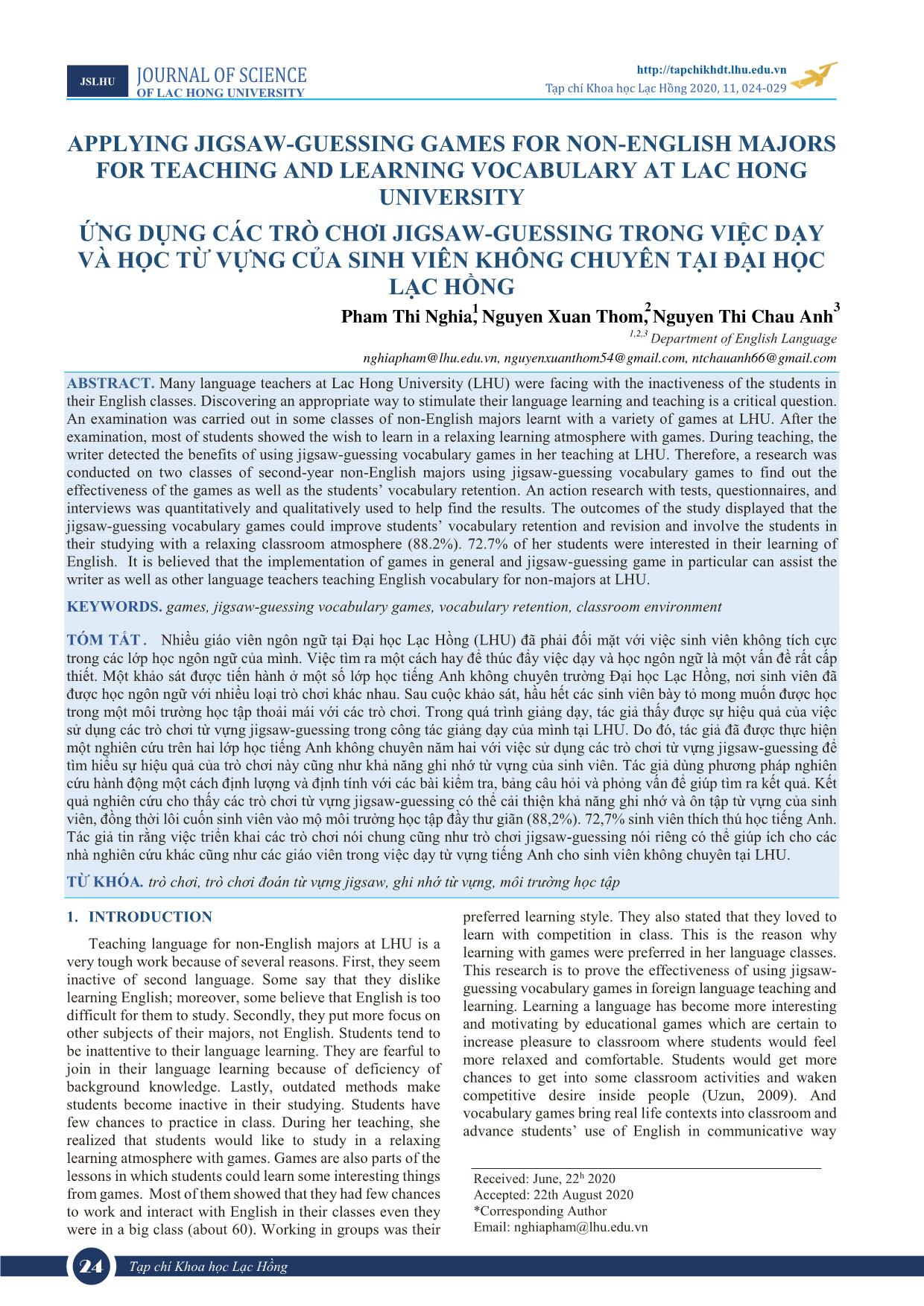
Trang 1
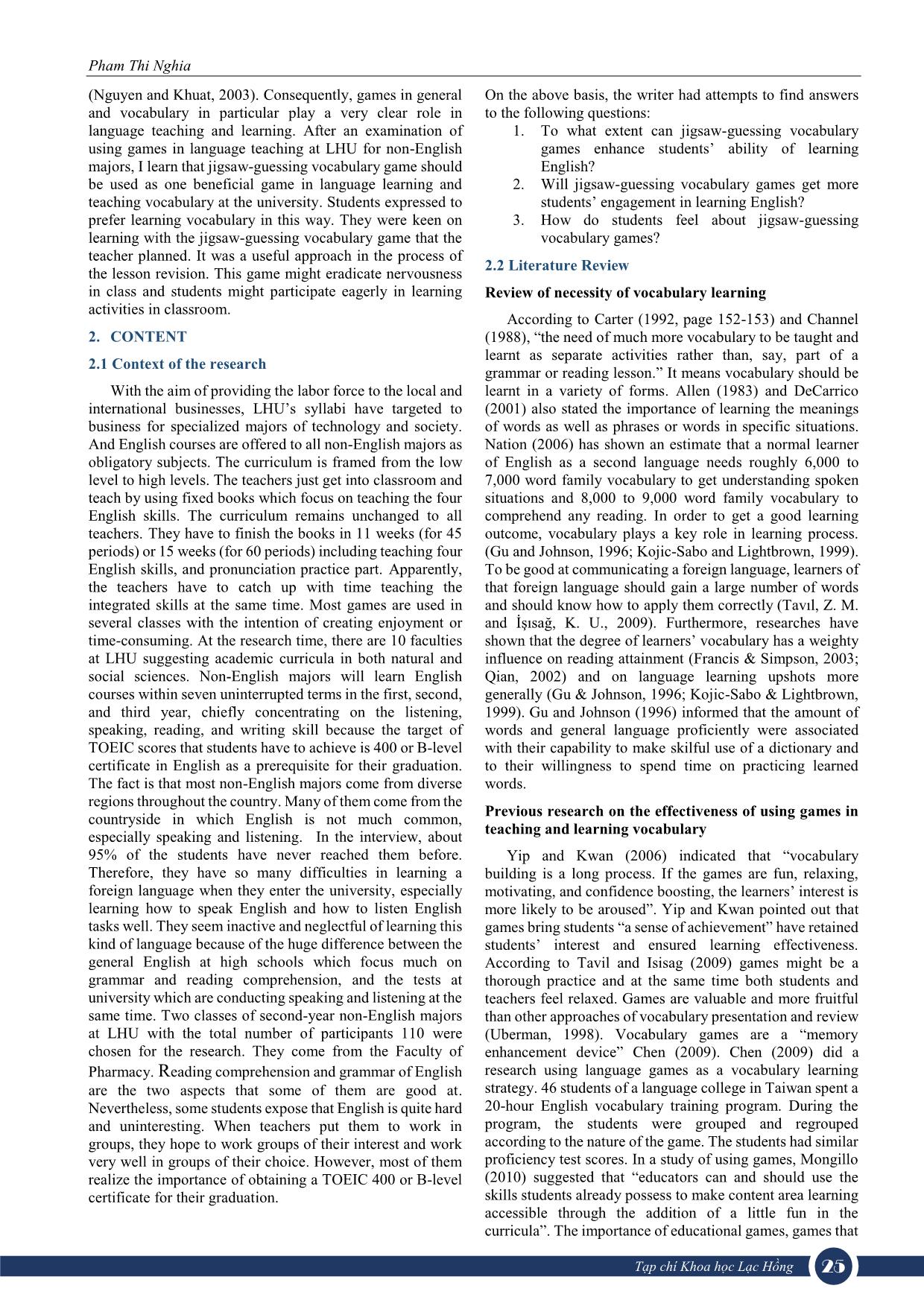
Trang 2
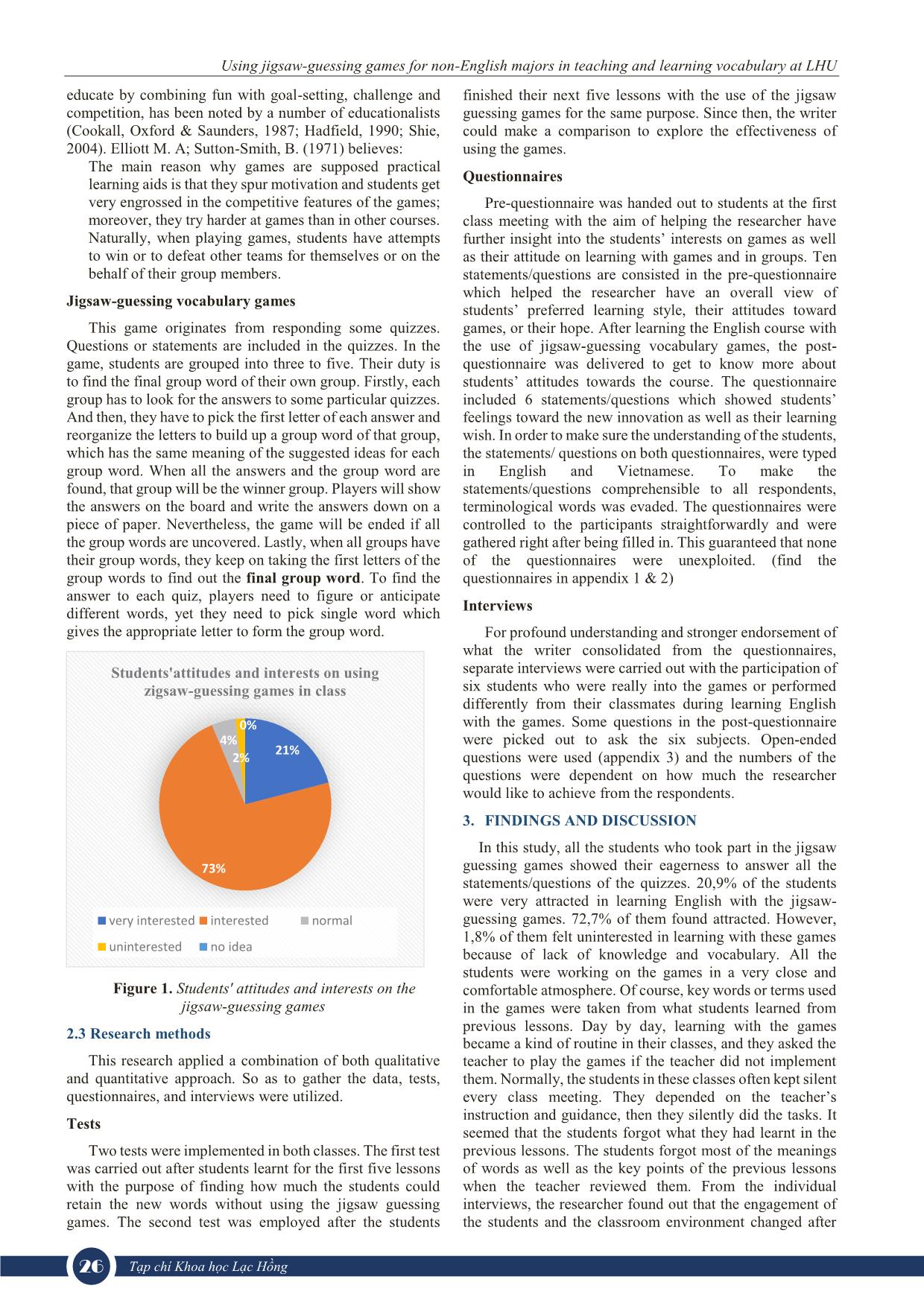
Trang 3
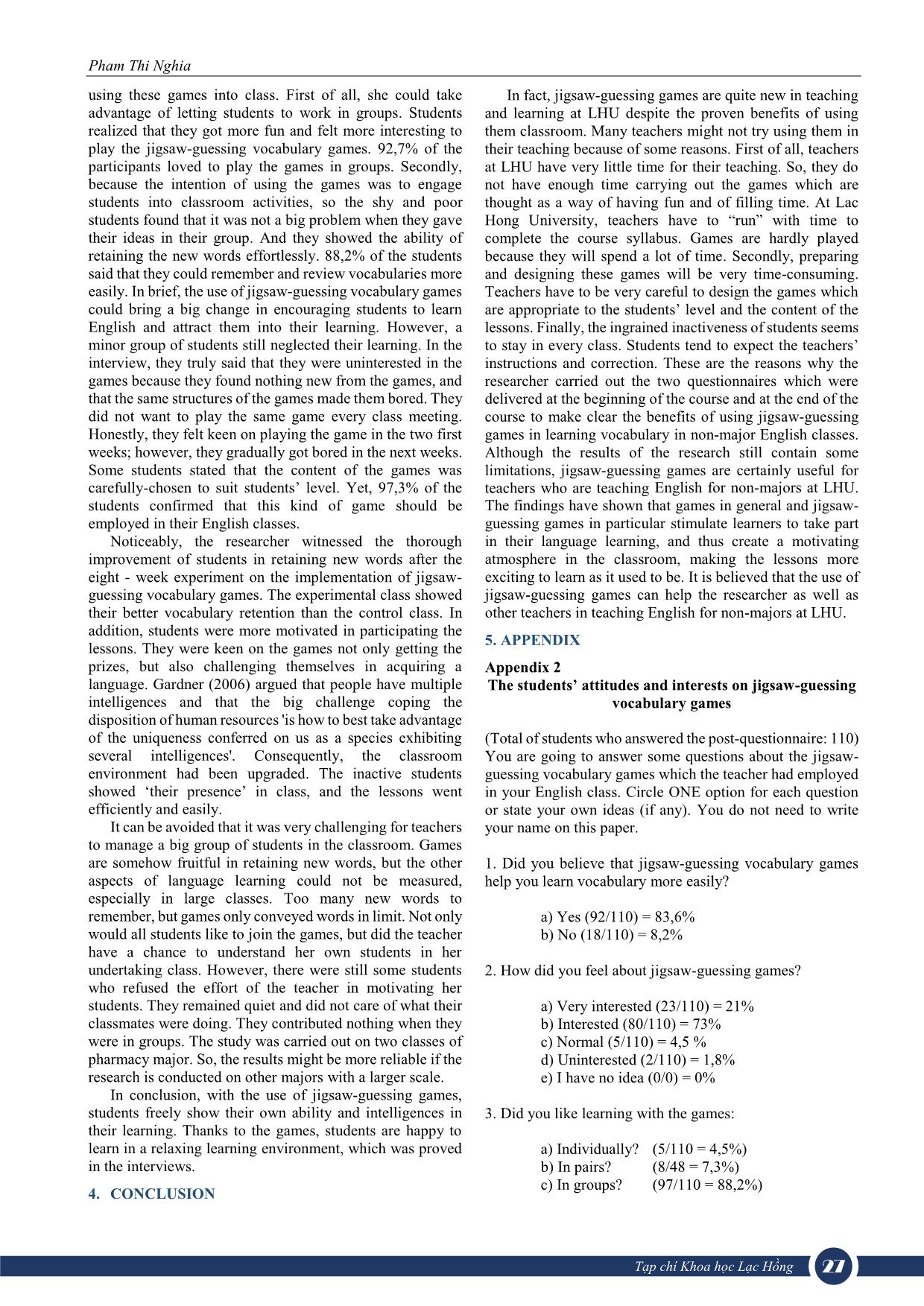
Trang 4
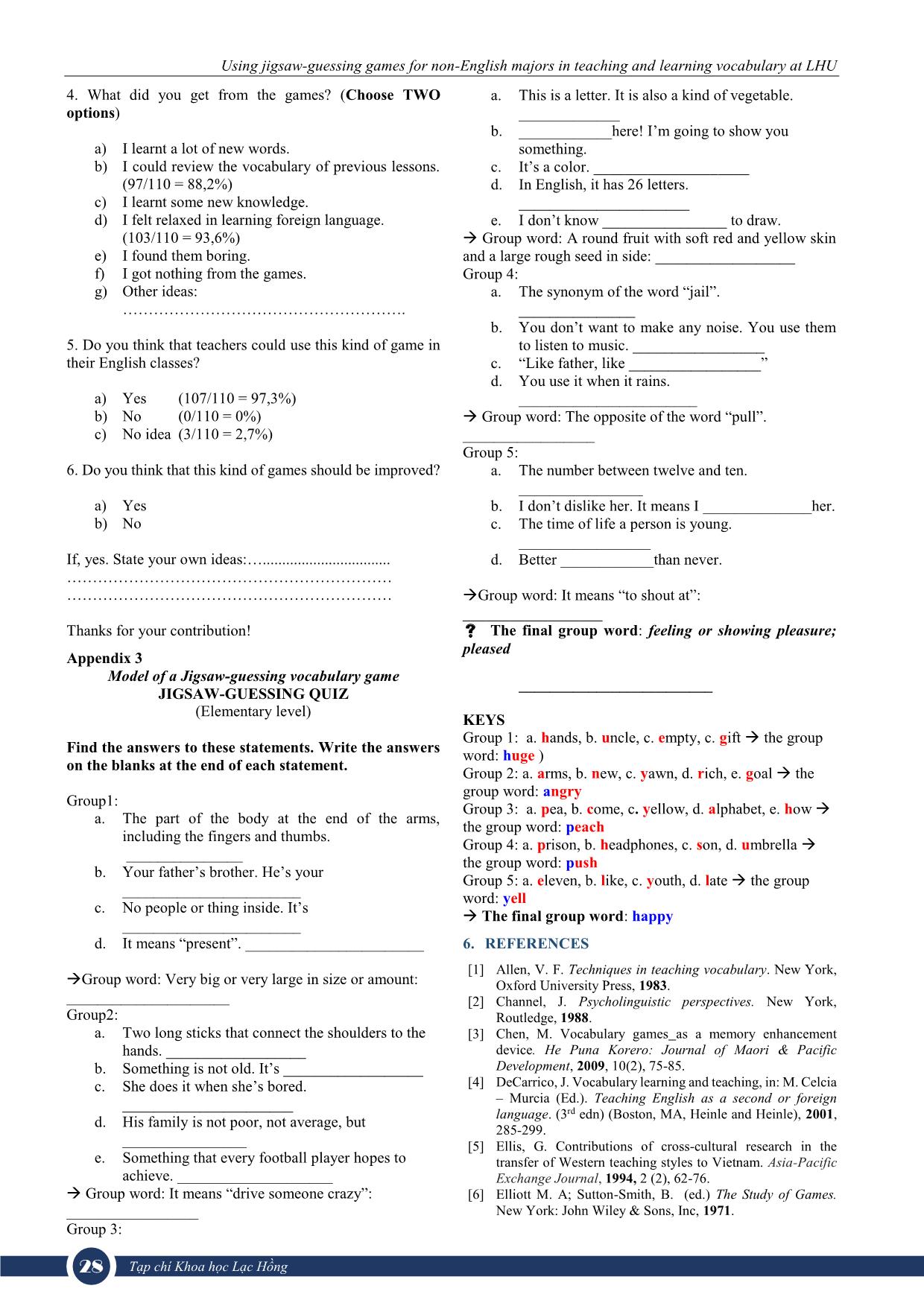
Trang 5

Trang 6
Tóm tắt nội dung tài liệu: Ứng dụng các trò chơi Jigsaw-Guessing trong việc dạy và học từ vựng của sinh viên không chuyên tại Đại học Lạc Hồng
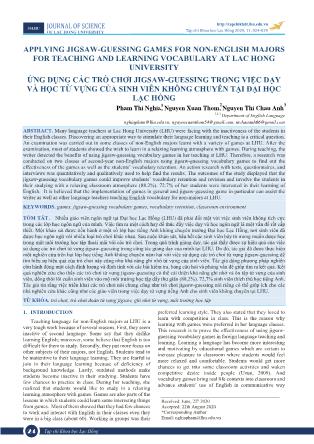
Tạp chí Khoa học Lạc Hồng24 JSLHU JOURNAL OF SCIENCE OF LAC HONG UNIVERSITY www.jslhu.edu.vn Tạp chí Khoa học Lạc Hồng 2020, , 1-6 APPLYING JIGSAW-GUESSING GAMES FOR NON-ENGLISH MAJORS FOR TEACHING AND LEARNING VOCABULARY AT LAC HONG UNIVERSITY ỨNG DỤNG CÁC TRÒ CHƠI JIGSAW-GUESSING TRONG VIỆC DẠY VÀ HỌC TỪ VỰNG CỦA SINH VIÊN KHÔNG CHUYÊN TẠI ĐẠI HỌC LẠC HỒNG Pham Thi Nghia Department of English Language nghiapham@lhu.edu.vn ABSTRACT. Many language teachers at Lac Hong University (LHU) were facing with the inactiveness of the students in their English classes. Discovering an appropriate way to stimulate their language learning and teaching is a critical question. An examination was carried out in some classes of non-English majors learnt with a variety of games at LHU. After the examination, most of students showed the wish to learn in a relaxing learning atmosphere with games. During teaching, the writer detected the benefits of using jigsaw-guessing vocabulary games in her teaching at LHU. Therefore, a research was conducted on two classes of second-year non-English majors using jigsaw-guessing vocabulary games to find out the effectiveness of the games as well as the students’ vocabulary retention. An action research with tests, questionnaires, and interviews was quantitatively and qualitatively used to help find the results. The outcomes of the study displayed that the jigsaw-guessing vocabulary games could improve students’ vocabulary retention and revision and involve the students in their studying with a relaxing classroom atmosphere (88.2%). 72.7% of her students were interested in their learning of English. It is believed that the implementation of games in general and jigsaw-guessing game in particular can assist the writer as well as other language teachers teaching English vocabulary for non-majors at LHU. KEYWORDS. games, jigsaw-guessing vocabulary games, vocabulary retention, classroom environment TÓM TẮT. Nhiều giáo viên ngôn ngữ tại Đại học Lạc Hồng (LHU) đã phải đối mặt với việc sinh viên không tích cực trong các lớp học ngôn ngữ của mình. Việc tìm ra một cách hay để thúc đẩy việc dạy và học ngôn ngữ là một vấn đề rất cấp thiết. Một khảo sát được tiến hành ở một số lớp học tiếng Anh không chuyên trường Đại học Lạc Hồng, nơi sinh viên đã được học ngôn ngữ với nhiều loại trò chơi khác nhau. Sau cuộc khảo sát, hầu hết các sinh viên bày tỏ mong muốn được học trong một môi trường học tập thoải mái với các trò chơi. Trong quá trình giảng dạy, tác giả thấy được sự hiệu quả của việc sử dụng các trò chơi từ vựng jigsaw-guessing trong công tác giảng dạy của mình tại LHU. Do đó, tác giả đã được thực hiện một nghiên cứu trên hai lớp học tiếng Anh không chuyên năm hai với việc sử dụng các trò chơi từ vựng jigsaw-guessing để tìm hiểu sự hiệu quả của trò chơi này cũng như khả năng ghi nhớ từ vựng của sinh viên. Tác giả dùng phương pháp nghiên cứu hành động một cách định lượng và định tính với các bài kiểm tra, bảng câu hỏi và phỏng vấn để giúp tìm ra kết quả. Kết quả nghiên cứu cho thấy các trò chơi từ vựng jigsaw-guessing có thể cải thiện khả năng ghi nhớ và ôn tập từ vựng của sinh viên, đồng thời lôi cuốn sinh viên vào mộ môi trường học tập đầy thư giãn (88,2%). 72,7% sinh viên thích thú học tiếng Anh. Tác giả tin rằng việc triển khai các trò chơi nói chung cũng như trò chơi jigsaw-guessing nói riêng có thể giúp ích cho các nhà nghiên cứu khác cũng như các giáo viên trong việc dạy từ vựng tiếng Anh cho sinh viên không chuyên tại LHU. TỪ KHÓA. trò chơi, trò chơi đoán từ vựng jigsaw, ghi nhớ từ vựng, môi trường học tập 1. INTRODUCTION Teaching language for non-English majors at LHU is a very tough work because of several reasons. First, they seem inactive of second language. Some say that they dislike learning English; moreover, some believe that English is too difficult for them to study. Secondly, they put more focus on other subjects of their majors, not English. Students tend to be inattentive to their language learning. They are fearful to join in their language learning because of deficiency of background knowledge. Lastly, outdated methods make students become inactive in their studying. Students have few chances to practice in class. During her teaching, she realized that students would like to study in a relaxing learning atmosphere with games. Games are also parts of the lessons in which students could learn some interesting things from games. Most of them showed that they had few chances to work and interact with English in their classes even they were in a big class (about 60). Working in groups was their preferred learning style. They also stated that they loved to learn with competition in class. This is the reason why learning with games were preferred in her language classes. This research is to prove the effectiveness of using jigsaw- guessing vocabulary games in foreign l ... were controlled to the participants straightforwardly and were gathered right after being filled in. This guaranteed that none of the questionnaires were unexploited. (find the questionnaires in appendix 1 & 2) Interviews For profound understanding and stronger endorsement of what the writer consolidated from the questionnaires, separate interviews were carried out with the participation of six students who were really into the games or performed differently from their classmates during learning English with the games. Some questions in the post-questionnaire were picked out to ask the six subjects. Open-ended questions were used (appendix 3) and the numbers of the questions were dependent on how much the researcher would like to achieve from the respondents. 3. FINDINGS AND DISCUSSION In this study, all the students who took part in the jigsaw guessing games showed their eagerness to answer all the statements/questions of the quizzes. 20,9% of the students were very attracted in learning English with the jigsaw- guessing games. 72,7% of them found attracted. However, 1,8% of them felt uninterested in learning with these games because of lack of knowledge and vocabulary. All the students were working on the games in a very close and comfortable atmosphere. Of course, key words or terms used in the games were taken from what students learned from previous lessons. Day by day, learning with the games became a kind of routine in their classes, and they asked the teacher to play the games if the teacher did not implement them. Normally, the students in these classes often kept silent every class meeting. They depended on the teacher’s instruction and guidance, then they silently did the tasks. It seemed that the students forgot what they had learnt in the previous lessons. The students forgot most of the meanings of words as well as the key points of the previous lessons when the teacher reviewed them. From the individual interviews, the researcher found out that the engagement of the students and the classroom environment changed after 21% 73% 4% 2% 0% Students'attitudes and interests on using zigsaw-guessing games in class very interested interested normal uninterested no idea Tạp chí Khoa học Lạc Hồng 27 Pham Thi Nghia using these games into class. First of all, she could take advantage of letting students to work in groups. Students realized that they got more fun and felt more interesting to play the jigsaw-guessing vocabulary games. 92,7% of the participants loved to play the games in groups. Secondly, because the intention of using the games was to engage students into classroom activities, so the shy and poor students found that it was not a big problem when they gave their ideas in their group. And they showed the ability of retaining the new words effortlessly. 88,2% of the students said that they could remember and review vocabularies more easily. In brief, the use of jigsaw-guessing vocabulary games could bring a big change in encouraging students to learn English and attract them into their learning. However, a minor group of students still neglected their learning. In the interview, they truly said that they were uninterested in the games because they found nothing new from the games, and that the same structures of the games made them bored. They did not want to play the same game every class meeting. Honestly, they felt keen on playing the game in the two first weeks; however, they gradually got bored in the next weeks. Some students stated that the content of the games was carefully-chosen to suit students’ level. Yet, 97,3% of the students confirmed that this kind of game should be employed in their English classes. Noticeably, the researcher witnessed the thorough improvement of students in retaining new words after the eight - week experiment on the implementation of jigsaw- guessing vocabulary games. The experimental class showed their better vocabulary retention than the control class. In addition, students were more motivated in participating the lessons. They were keen on the games not only getting the prizes, but also challenging themselves in acquiring a language. Gardner (2006) argued that people have multiple intelligences and that the big challenge coping the disposition of human resources 'is how to best take advantage of the uniqueness conferred on us as a species exhibiting several intelligences'. Consequently, the classroom environment had been upgraded. The inactive students showed ‘their presence’ in class, and the lessons went efficiently and easily. It can be avoided that it was very challenging for teachers to manage a big group of students in the classroom. Games are somehow fruitful in retaining new words, but the other aspects of language learning could not be measured, especially in large classes. Too many new words to remember, but games only conveyed words in limit. Not only would all students like to join the games, but did the teacher have a chance to understand her own students in her undertaking class. However, there were still some students who refused the effort of the teacher in motivating her students. They remained quiet and did not care of what their classmates were doing. They contributed nothing when they were in groups. The study was carried out on two classes of pharmacy major. So, the results might be more reliable if the research is conducted on other majors with a larger scale. In conclusion, with the use of jigsaw-guessing games, students freely show their own ability and intelligences in their learning. Thanks to the games, students are happy to learn in a relaxing learning environment, which was proved in the interviews. 4. CONCLUSION In fact, jigsaw-guessing games are quite new in teaching and learning at LHU despite the proven benefits of using them classroom. Many teachers might not try using them in their teaching because of some reasons. First of all, teachers at LHU have very little time for their teaching. So, they do not have enough time carrying out the games which are thought as a way of having fun and of filling time. At Lac Hong University, teachers have to “run” with time to complete the course syllabus. Games are hardly played because they will spend a lot of time. Secondly, preparing and designing these games will be very time-consuming. Teachers have to be very careful to design the games which are appropriate to the students’ level and the content of the lessons. Finally, the ingrained inactiveness of students seems to stay in every class. Students tend to expect the teachers’ instructions and correction. These are the reasons why the researcher carried out the two questionnaires which were delivered at the beginning of the course and at the end of the course to make clear the benefits of using jigsaw-guessing games in learning vocabulary in non-major English classes. Although the results of the research still contain some limitations, jigsaw-guessing games are certainly useful for teachers who are teaching English for non-majors at LHU. The findings have shown that games in general and jigsaw- guessing games in particular stimulate learners to take part in their language learning, and thus create a motivating atmosphere in the classroom, making the lessons more exciting to learn as it used to be. It is believed that the use of jigsaw-guessing games can help the researcher as well as other teachers in teaching English for non-majors at LHU. 5. APPENDIX Appendix 2 The students’ attitudes and interests on jigsaw-guessing vocabulary games (Total of students who answered the post-questionnaire: 110) You are going to answer some questions about the jigsaw- guessing vocabulary games which the teacher had employed in your English class. Circle ONE option for each question or state your own ideas (if any). You do not need to write your name on this paper. 1. Did you believe that jigsaw-guessing vocabulary games help you learn vocabulary more easily? a) Yes (92/110) = 83,6% b) No (18/110) = 8,2% 2. How did you feel about jigsaw-guessing games? a) Very interested (23/110) = 21% b) Interested (80/110) = 73% c) Normal (5/110) = 4,5 % d) Uninterested (2/110) = 1,8% e) I have no idea (0/0) = 0% 3. Did you like learning with the games: a) Individually? (5/110 = 4,5%) b) In pairs? (8/48 = 7,3%) c) In groups? (97/110 = 88,2%) Tạp chí Khoa học Lạc Hồng28 Using jigsaw-guessing games for non-English majors in teaching and learning vocabulary at LHU 4. What did you get from the games? (Choose TWO options) a) I learnt a lot of new words. b) I could review the vocabulary of previous lessons. (97/110 = 88,2%) c) I learnt some new knowledge. d) I felt relaxed in learning foreign language. (103/110 = 93,6%) e) I found them boring. f) I got nothing from the games. g) Other ideas: . 5. Do you think that teachers could use this kind of game in their English classes? a) Yes (107/110 = 97,3%) b) No (0/110 = 0%) c) No idea (3/110 = 2,7%) 6. Do you think that this kind of games should be improved? a) Yes b) No If, yes. State your own ideas:................................. Thanks for your contribution! Appendix 3 Model of a Jigsaw-guessing vocabulary game JIGSAW-GUESSING QUIZ (Elementary level) Find the answers to these statements. Write the answers on the blanks at the end of each statement. Group1: a. The part of the body at the end of the arms, including the fingers and thumbs. _______________ b. Your father’s brother. He’s your _______________________ c. No people or thing inside. It’s _______________________ d. It means “present”. _______________________ Group word: Very big or very large in size or amount: _____________________ Group2: a. Two long sticks that connect the shoulders to the hands. __________________ b. Something is not old. It’s __________________ c. She does it when she’s bored. ______________________ d. His family is not poor, not average, but ________________ e. Something that every football player hopes to achieve. ____________________ Group word: It means “drive someone crazy”: _________________ Group 3: a. This is a letter. It is also a kind of vegetable. _____________ b. ____________here! I’m going to show you something. c. It’s a color. ____________________ d. In English, it has 26 letters. ______________________ e. I don’t know ________________ to draw. Group word: A round fruit with soft red and yellow skin and a large rough seed in side: __________________ Group 4: a. The synonym of the word “jail”. _______________ b. You don’t want to make any noise. You use them to listen to music. _________________ c. “Like father, like _________________” d. You use it when it rains. _______________________ Group word: The opposite of the word “pull”. _________________ Group 5: a. The number between twelve and ten. ________________ b. I don’t dislike her. It means I ______________her. c. The time of life a person is young. _________________ d. Better ____________than never. Group word: It means “to shout at”: __________________ The final group word: feeling or showing pleasure; pleased _________________________ KEYS Group 1: a. hands, b. uncle, c. empty, c. gift the group word: huge ) Group 2: a. arms, b. new, c. yawn, d. rich, e. goal the group word: angry Group 3: a. pea, b. come, c. yellow, d. alphabet, e. how the group word: peach Group 4: a. prison, b. headphones, c. son, d. umbrella the group word: push Group 5: a. eleven, b. like, c. youth, d. late the group word: yell The final group word: happy 6. REFERENCES [1] Allen, V. F. Techniques in teaching vocabulary. New York, Oxford University Press, 1983. [2] Channel, J. Psycholinguistic perspectives. New York, Routledge, 1988. [3] Chen, M. Vocabulary games as a memory enhancement device. He Puna Korero: Journal of Maori & Pacific Development, 2009, 10(2), 75-85. [4] DeCarrico, J. Vocabulary learning and teaching, in: M. Celcia – Murcia (Ed.). Teaching English as a second or foreign language. (3rd edn) (Boston, MA, Heinle and Heinle), 2001, 285-299. [5] Ellis, G. Contributions of cross-cultural research in the transfer of Western teaching styles to Vietnam. Asia-Pacific Exchange Journal, 1994, 2 (2), 62-76. [6] Elliott M. A; Sutton-Smith, B. (ed.) The Study of Games. New York: John Wiley & Sons, Inc, 1971. Tạp chí Khoa học Lạc Hồng 29 Pham Thi Nghia [7] Francis, M. A. & Simpson, M. L. Using theory, our intuition, and a research study to enhance students’ vocabulary knowledge. Journal of Adolescent and Adult Literacy, 2003, 47 (1), 66-78. [8] Gardner, H. Multiple intelligences: New horizons. New York, NY: Basic Books, 2006. [9] Gu, Y. & Johnson, R. K. Vocabulary learning strategies and language learning outcomes. Language Learning, 1996, 46, 643- 679. [10] Hadfield, J. Intermediate communication games: A collection of games and activities for low to mid-intermediate students of English. Walton-on-Thames: Nelson, 1990. [11] Kojic-Sabo, I. & Lightbrown, P. M. Students’ approach to vocabulary learning and their relationship to success. The Modern Language Journal, 1999, 83(2), 176-192. [12] Mongillo, G. Can learning be fun and games? The influence of everyday language on students’content vocabulary use and concept understanding. Language & Literacy: A Canadian Educational E-Journal, 2010, 12(1), 97-115. [13] Nation, I. S. P. How a large vocabulary is needed for reading and listening? The Canadian Modern Language Review, 2006, 63(1), 59-82. [14] Nguyen, T. H. and Khuat, T. N. Learning vocabulary through games. Asian EFL Journal, 2008, 5(4), 90-105, – efl – jounal. com/ dec 03 vn. pdf (09.06.2008). [15] Qian, D. D. Investigating the relationship between vocabulary knowledge and academic reading performance: An assessment perspective. Language Learning, 2002, 52 (3), 513-536. [16] Tavıl, Z. Müge; İşısağ, Korkut U. Teaching vocabulary to very young learners through games and songs. Ekev Academic Review, 2009, 13(38), 299-308. [17] Uberman, A. The use of games for vocabulary presentation and revision. English Teaching Forum, 1998, 36(1), 20-27. [18] Uzun, L. An evaluative checklist for computer games used for foreign language vocabulary learning and practice: VocaWord sample. Novitas-ROYAL, 2009, 3(1), 45-59. [19] Yip, F. W. M.; Kwan, A. C. M. Online vocabulary games as a tool for teaching and learning English vocabulary. Educational Media International, 2006, 43(3), 233-249.
File đính kèm:
 ung_dung_cac_tro_choi_jigsaw_guessing_trong_viec_day_va_hoc.pdf
ung_dung_cac_tro_choi_jigsaw_guessing_trong_viec_day_va_hoc.pdf

